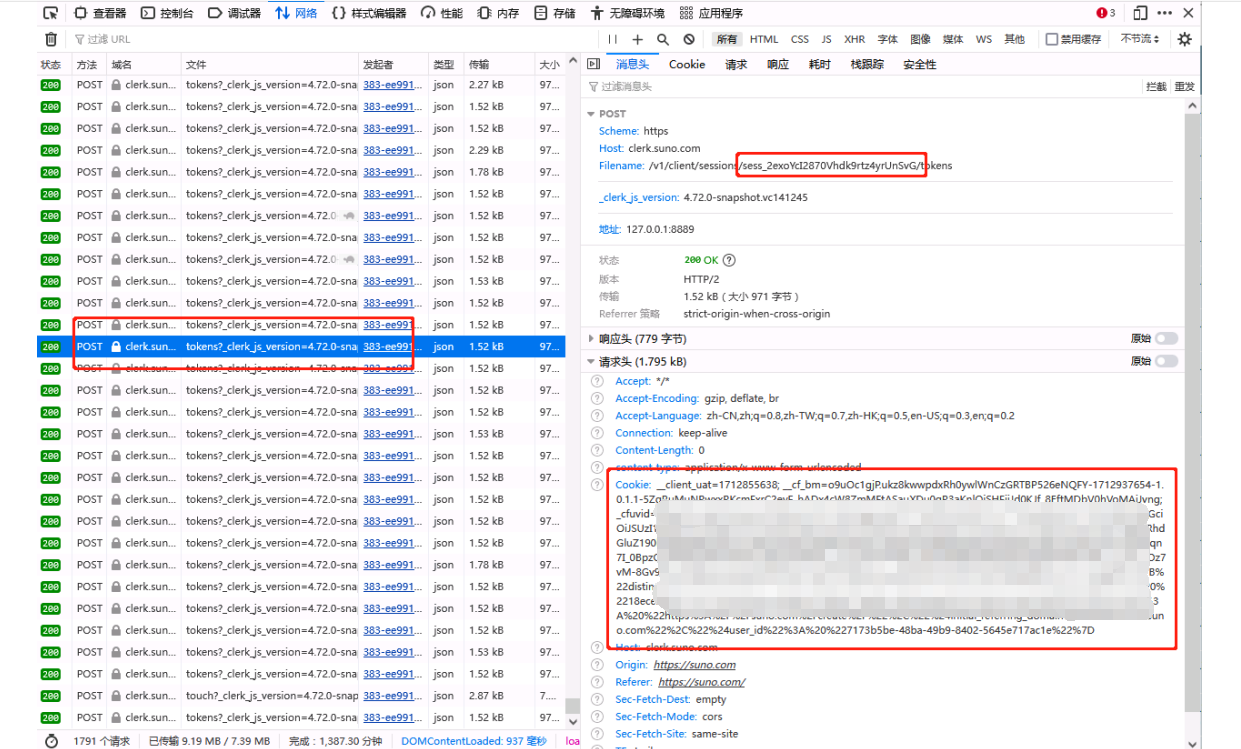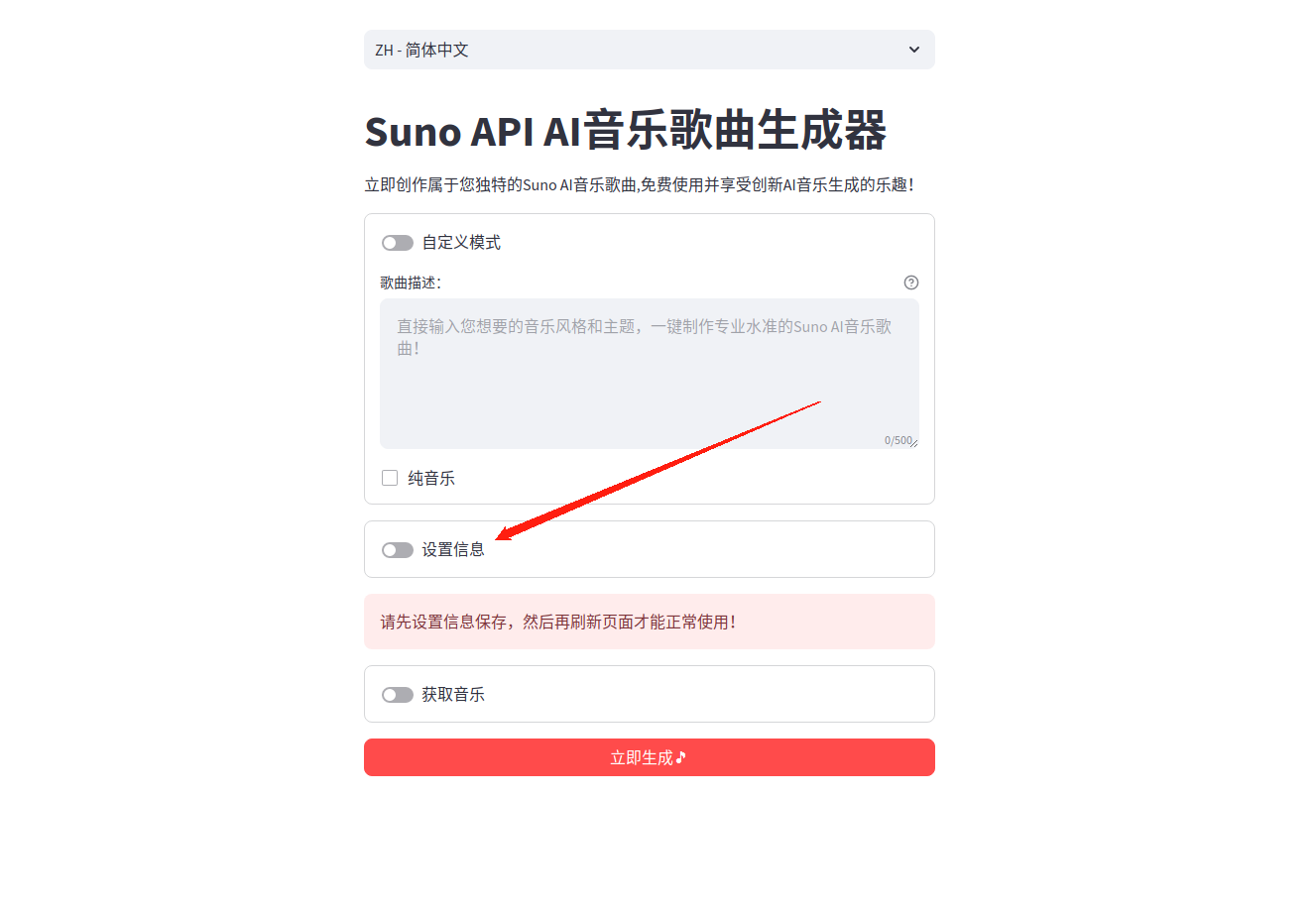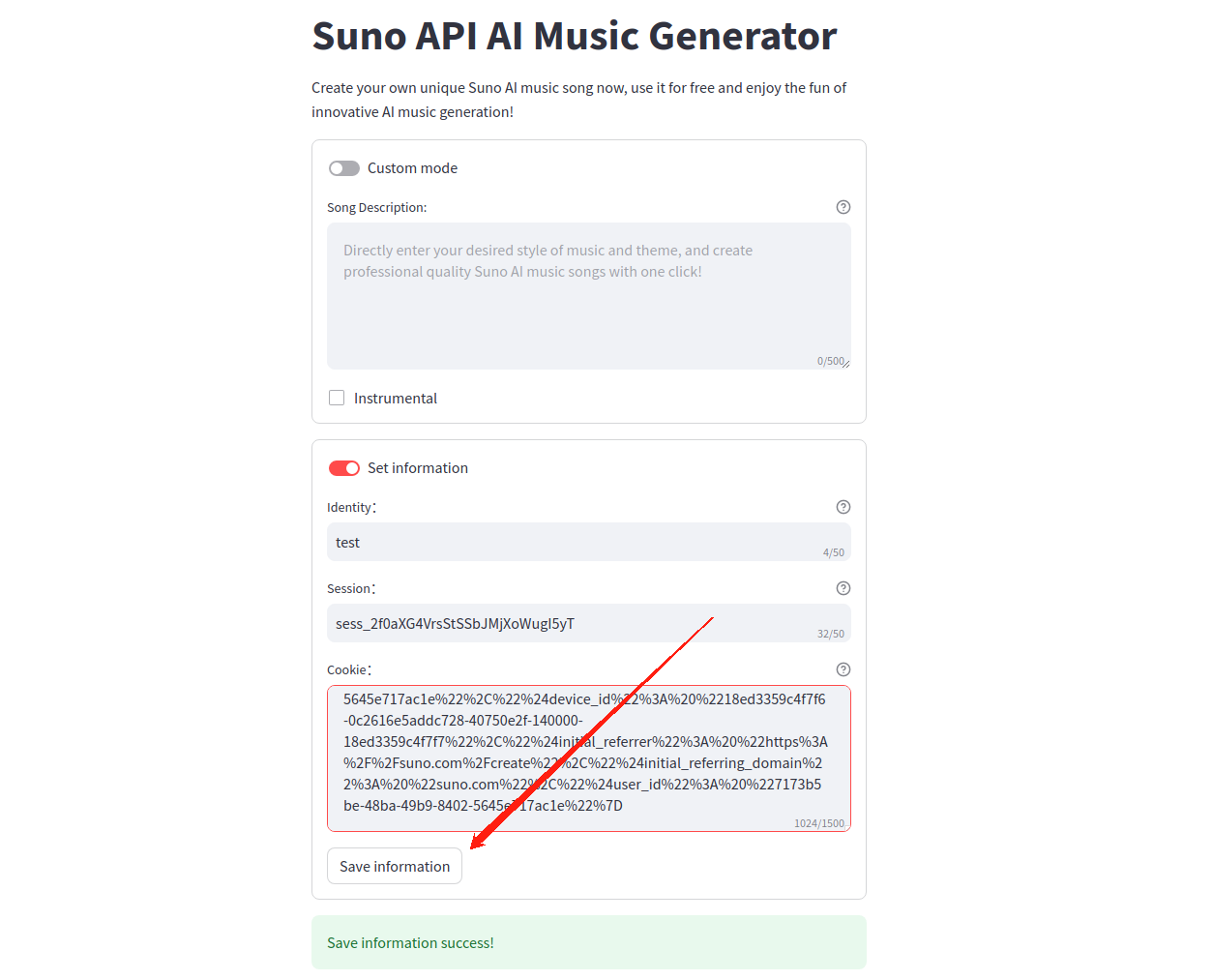
SunoApi
SunoAPI Unofficial Suno AI client, currently supports the generation of music, access to music information and other functions.
Stars: 109
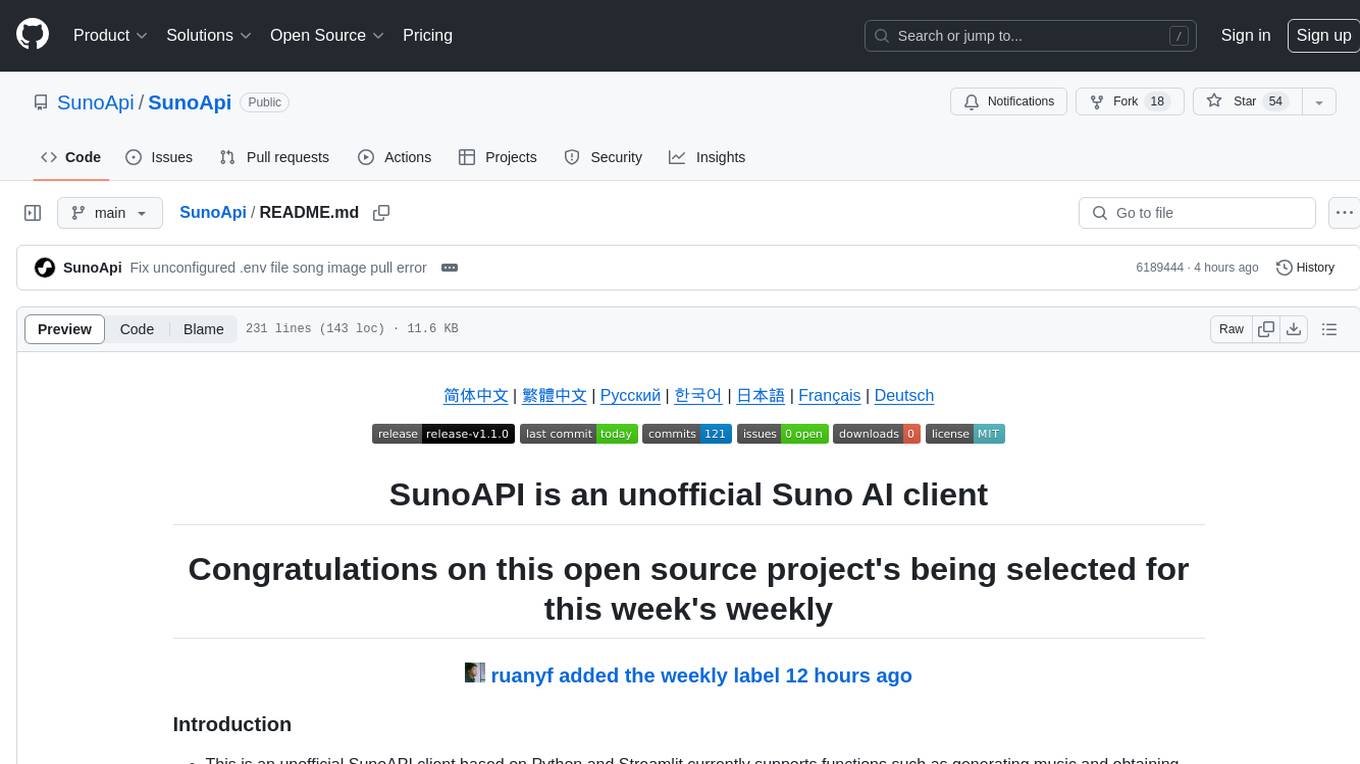
SunoAPI is an unofficial client for Suno AI, built on Python and Streamlit. It supports functions like generating music and obtaining music information. Users can set up multiple account information to be saved for use. The tool also features built-in maintenance and activation functions for tokens, eliminating concerns about token expiration. It supports multiple languages and allows users to upload pictures for generating songs based on image content analysis.
README:
-
This is an unofficial SunoAPI client based on Python and Streamlit currently supports functions such as generating music and obtaining music information. It comes with built-in maintenance and activation functions for tokens, so there is no need to worry about token expiration. You can set up multiple account information to be saved for use.
-
GitHub sometimes cannot be accessed. If it cannot be accessed, please move to Gitee address: https://gitee.com/SunoApi/SunoApi
- Set account information and automatically maintain and keep the program active
- Multiple account information can be set to be saved and used
- Music Sharing Square showcases all publicly available songs
- Enter the music feed ID to directly obtain song information
- Support to upload pictures, according to the content of the image analysis to generate songs
- Support multiple languages such as Chinese, English, Korean, Japanese, etc
- Clone source code
git clone https://github.com/SunoApi/SunoApi.git- Installation dependencies
cd SunoApi
pip3 install -r requirements.txt- . env environment variable file requires the use of the gpt-4o model for image recognition. The OpenAI interface can be used, or other commonly used interfaces can be used to replace it. Register a console.bitiful.com object storage account to obtain the S3_ACCESSKEY_ID,S3_SECRETKEY_ID parameter, which is used to upload images to the storage bucket you created. Fill in the external access domain name of your object storage account after creating the storage bucket in S3_WEB_SITE_URL. This way, the local environment can test image recognition.
OPENAI_BASE_URL = https://chatplusapi.cn
OPENAI_API_KEY = sk-xxxxxxxxxxxxxxxxxxxx
#S3_WEB_SITE_URL = https://cdn1.suno.ai
#S3_WEB_SITE_URL = http://localhost:8501
#S3_WEB_SITE_URL = http://123.45.67.8:8501
#S3_WEB_SITE_URL = https://sunoapi.s3.bitiful.net
S3_WEB_SITE_URL = https://res.sunoapi.net
S3_ACCESSKEY_ID = xxxxxxxxxxxxxxxxxxxx
S3_SECRETKEY_ID = xxxxxxxxxxxxxxxxxxxx- Start the project, please refer to the Streamlit documentation for details on Streamlit
streamlit run main.py --server.maxUploadSize=3docker run -d \
--name sunoapi \
--restart always \
-p 8501:8501 \
-v ./sunoapi.db:/app/sunoapi.db \
-v ./images/upload:/app/images/upload \
-v ./audios/upload:/app/audios/upload \
-e OPENAI_BASE_URL=https://api.openai.com \
-e OPENAI_API_KEY=sk-xxxxxxxxxxxxxxxxxxxx \
-e S3_WEB_SITE_URL=https://sunoapi.s3.bitiful.net \
-e S3_ACCESSKEY_ID=xxxxxxxxxxxxxxxxxxxx \
-e S3_SECRETKEY_ID=xxxxxxxxxxxxxxxxxxxx \
sunoapi/sunoapi:latestAttention: It is necessary to https://sunoapi.s3.bitiful.net Replace with the actual address you can access, and the final uploaded image file will pass through http://xxxxxx.s3.bitiful.net/images/upload/xxxxxx.jpg The format can be accessed, otherwise OpenAI cannot access the image you uploaded and cannot recognize its content. Therefore, the function of uploading images to generate music will not be available.
docker compose build && docker compose upFROM python:3.10-slim-buster
WORKDIR /app
COPY requirements.txt ./
RUN --mount=type=cache,target=/root/.cache/pip \
pip install -r requirements.txt --no-cache-dir
COPY . .
EXPOSE 8501
CMD [ "nohup", "streamlit", "run", "main.py", "--server.maxUploadSize=3" ]
docker-compose pull && docker-compose up -dversion: '3.2'
services:
sunoapi:
image: sunoapi/sunoapi:latest
container_name: sunoapi
ports:
- "8501:8501"
volumes:
- ./sunoapi.db:/app/sunoapi.db
- ./images/upload:/app/images/upload
- ./audios/upload:/app/audios/upload
environment:
- TZ=Asia/Shanghai
- OPENAI_BASE_URL=https://api.openai.com
- OPENAI_API_KEY=sk-xxxxxxxxxxxxxxxxxxxx
- S3_WEB_SITE_URL=https://sunoapi.s3.bitiful.net
- S3_ACCESSKEY_ID=xxxxxxxxxxxxxxxxxxxx
- S3_SECRETKEY_ID=xxxxxxxxxxxxxxxxxxxx
restart: always
Attention: To pull image deployment, you need to download sunoapi.db from the project and transfer it to your docker-compose.yml file directory. Otherwise, Docker startup will prompt that the file cannot be mounted.
- First, Fork a copy of SunoApi code to your Github repository
- Select Github authorization login: https://share.streamlit.io/
- Open the deployment page: https://share.streamlit.io/deploy
- Repository selection: SunoApi/SunoApi
- Branch input: main
- Main file path input: main.py
- Click Deploy!
-
First, retrieve your session and cookie from the browser page when logged in.
-
After filling in the setting information, it will automatically keep alive. You can fill in multiple account information.
-
Enter and save the information. You can modify the account information if you enter identity.
-
Once the project is up and running, visit http://localhost:8501/ in your browser.
- If the page prompt the message: Please save the information first, and then refresh the page to use it normally! Please first add your own account information and save it, then delete other invalid account information in the sunoapi.db database, including the account information I tested, and then you can use it normally.
- If the page prompt the message: Suno AI music song generation submission failed: Unauthorized. This indicates that the account login status is not authorized. This situation is usually caused by multiple browser clients logging in to the account and forming a preemption. Exit other logged in browser clients, keep the account logged in on this SunoAPI AI music song generator client, and do not log in on other browser clients.
- If the page prompt the message: "Suno AI Music song generation failed to submit: Insufficient credits." Indicates that the credits of account information are insufficient, please add your account information to save, and then you can use it normally.
- If the page prompt an error: ModuleNotFoundError: No module named 'streamlit_image select', this is because a streamlit_image select component has been developed for the second time. After the second development, this component is placed in the pages directory where the program runs. When loading the streamlit_image select component for the first time in the program running directory, it is loaded from the site packages directory of Python 3. However, the newly developed component cannot directly use pip3 to install the program saved in the streamlit_image select location. Otherwise, the functionality of the second development cannot be used. The solution is to click After connecting to other pages in the menu on the left, it can be loaded and used normally.
- After the music generation task is successfully submitted, the queue status of the generation task is pulled. When the status is "complete", it returns successfully. At this time, it defaults to waiting for the official generation file for 15 seconds. The official interface service directly returns the URL address of media files, and most of the time the page can display these media files normally. Occasionally, the interface may have returned the Url address of the media file, but the actual file cannot be accessed from the Url address and needs to wait for a while. At this point, the media file may not be able to be loaded on the page. You can right-click on the media player and copy the media file address. Open the address separately in the browser to access it, or right-click to save as download and save. Or go to the music sharing square page list to view the generated records.
- Regarding the security issue of saving account session and cookie information, as long as your account is not recharged, there is no need to worry because you do not know your account password. The session and cookie information you fill in will become invalid if your account logs in to other activities or logs out of the official website, and the session and cookie information you fill in will change the next time you log in to the official website.
- Professional lyric assistance tools: https://poe.com/SuperSunoMaster
- Github Issues: https://github.com/SunoApi/SunoApi/issues
- My personal strength is always limited, any form of contribution is welcome, including but not limited to contributing code, optimizing documents, submitting issues and PR. Due to limited time, we do not accept to submit bugs to developers in wechat or wechat group, please submit issues and PR if you have problems or optimization suggestions!
- Suno AI official website: https://suno.com
- Suno-API: https://github.com/SunoAI-API/Suno-API
- SunoAPI is an unofficial open source project for study and research only. Users voluntarily enter free account information to generate music. Each account generates five songs per day for free, and we don't use them for other purposes. Please feel free to use! If there are 10,000 users, the system can generate 50,000 songs per day for free. Please try to save your usage as you can only generate five songs per account per day for free. If everyone writes more than five songs a day, it's still not enough. The ultimate goal is to make it free to build whenever you need it.
For Tasks:
Click tags to check more tools for each tasksFor Jobs:
Alternative AI tools for SunoApi
Similar Open Source Tools

SunoApi
SunoAPI is an unofficial client for Suno AI, built on Python and Streamlit. It supports functions like generating music and obtaining music information. Users can set up multiple account information to be saved for use. The tool also features built-in maintenance and activation functions for tokens, eliminating concerns about token expiration. It supports multiple languages and allows users to upload pictures for generating songs based on image content analysis.

Sentient
Sentient is a personal, private, and interactive AI companion developed by Existence. The project aims to build a completely private AI companion that is deeply personalized and context-aware of the user. It utilizes automation and privacy to create a true companion for humans. The tool is designed to remember information about the user and use it to respond to queries and perform various actions. Sentient features a local and private environment, MBTI personality test, integrations with LinkedIn, Reddit, and more, self-managed graph memory, web search capabilities, multi-chat functionality, and auto-updates for the app. The project is built using technologies like ElectronJS, Next.js, TailwindCSS, FastAPI, Neo4j, and various APIs.
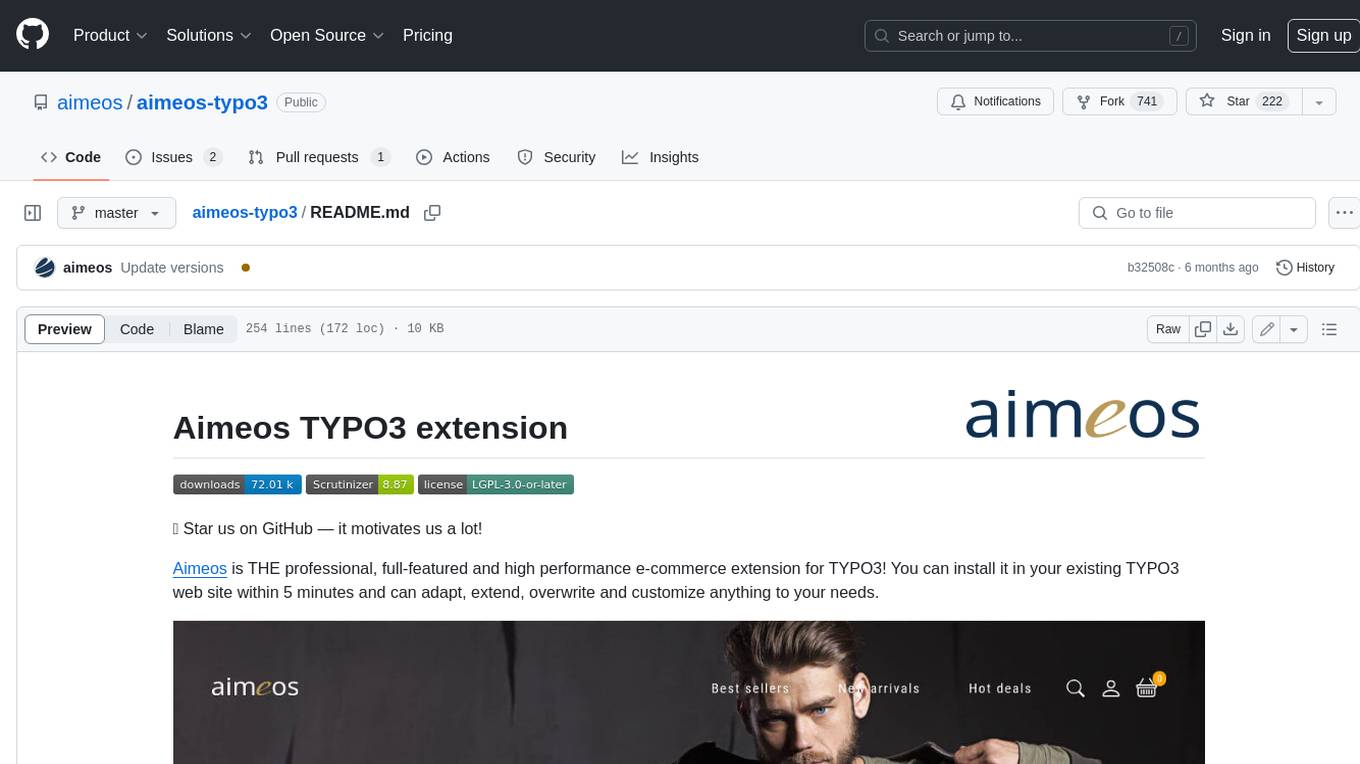
aimeos-typo3
Aimeos is a professional, full-featured, and high-performance e-commerce extension for TYPO3. It can be installed in an existing TYPO3 website within 5 minutes and can be adapted, extended, overwritten, and customized to meet specific needs.
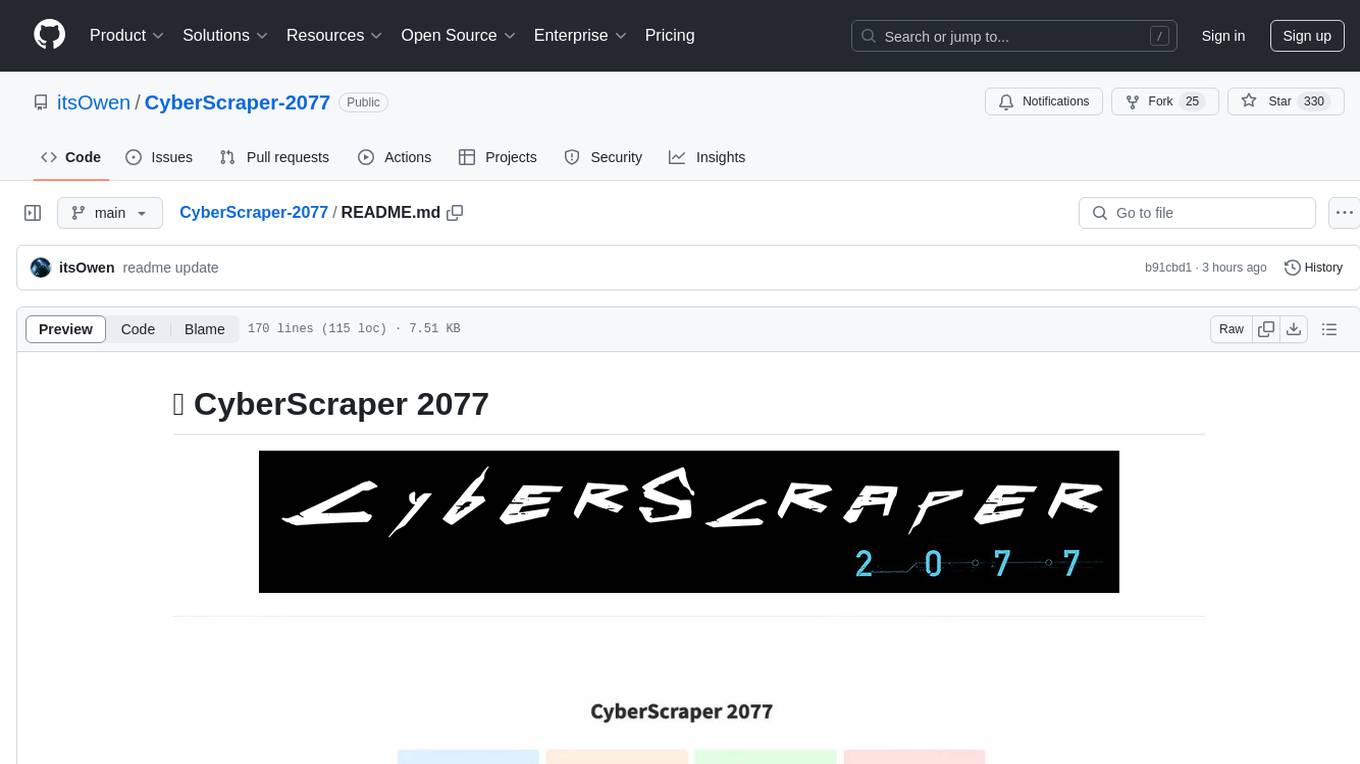
CyberScraper-2077
CyberScraper 2077 is an advanced web scraping tool powered by AI, designed to extract data from websites with precision and style. It offers a user-friendly interface, supports multiple data export formats, operates in stealth mode to avoid detection, and promises lightning-fast scraping. The tool respects ethical scraping practices, including robots.txt and site policies. With upcoming features like proxy support and page navigation, CyberScraper 2077 is a futuristic solution for data extraction in the digital realm.
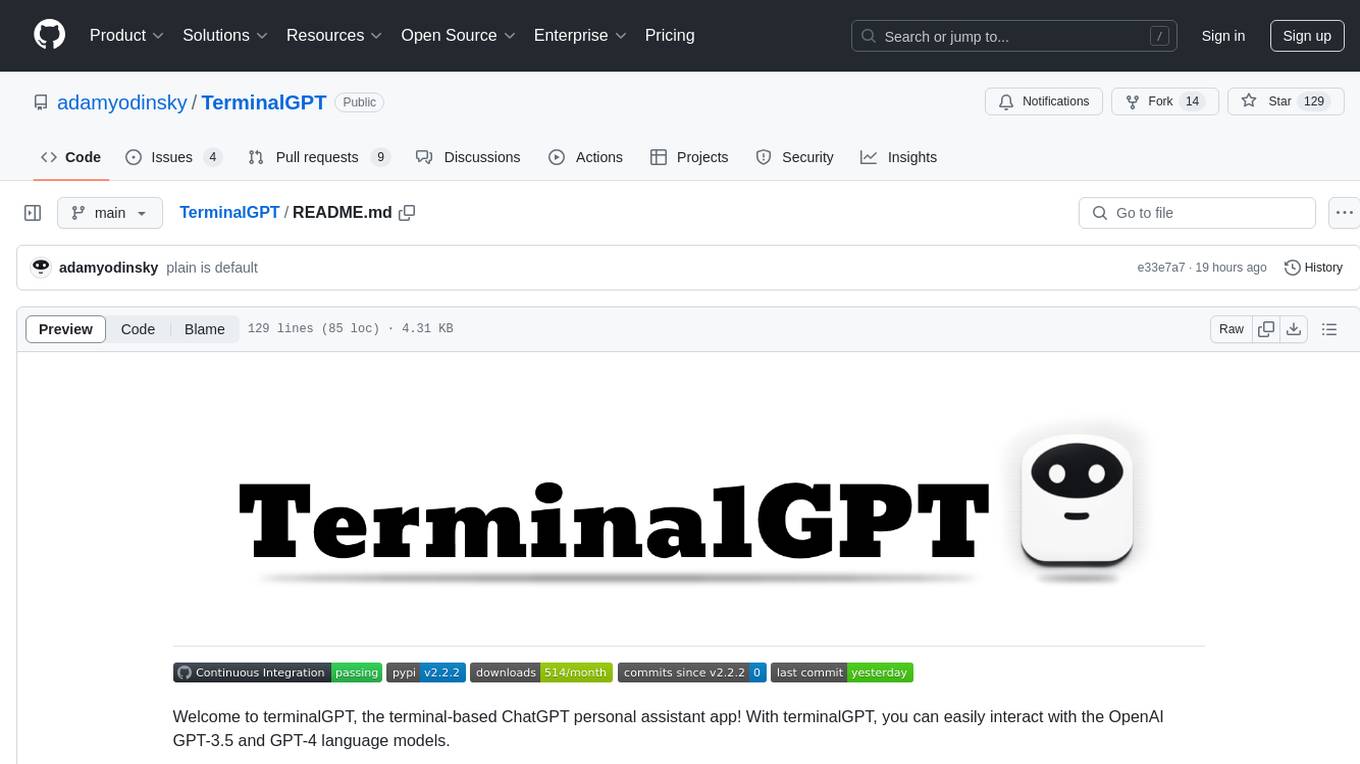
TerminalGPT
TerminalGPT is a terminal-based ChatGPT personal assistant app that allows users to interact with OpenAI GPT-3.5 and GPT-4 language models. It offers advantages over browser-based apps, such as continuous availability, faster replies, and tailored answers. Users can use TerminalGPT in their IDE terminal, ensuring seamless integration with their workflow. The tool prioritizes user privacy by not using conversation data for model training and storing conversations locally on the user's machine.
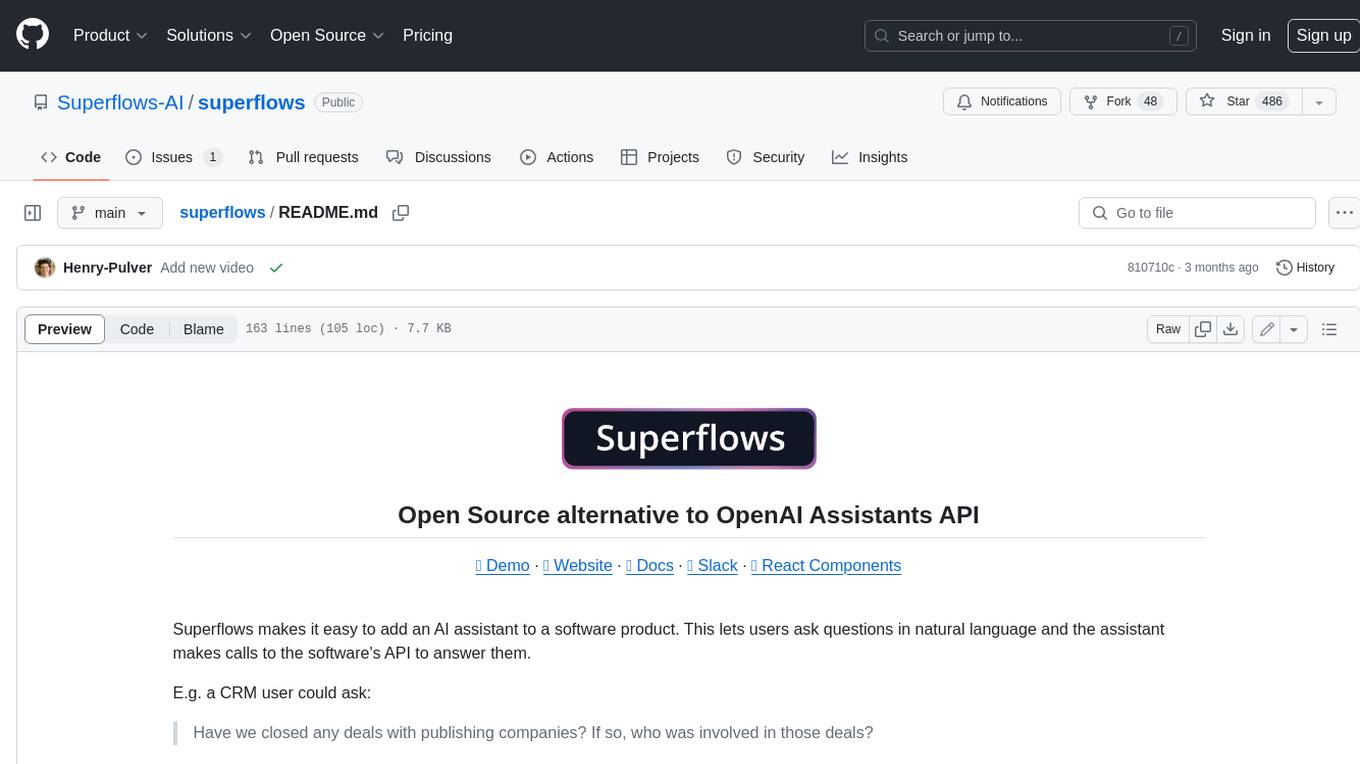
superflows
Superflows is an open-source alternative to OpenAI's Assistant API. It allows developers to easily add an AI assistant to their software products, enabling users to ask questions in natural language and receive answers or have tasks completed by making API calls. Superflows can analyze data, create plots, answer questions based on static knowledge, and even write code. It features a developer dashboard for configuration and testing, stateful streaming API, UI components, and support for multiple LLMs. Superflows can be set up in the cloud or self-hosted, and it provides comprehensive documentation and support.
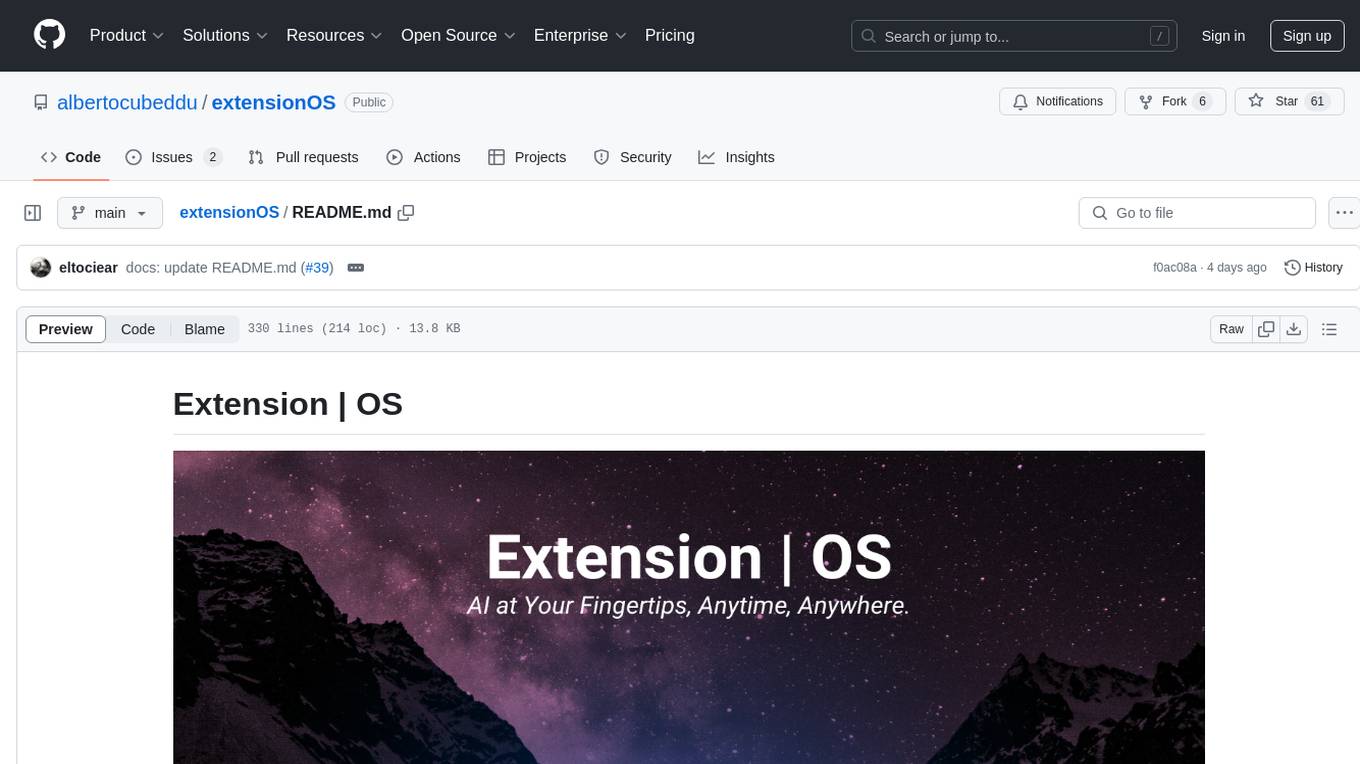
extensionOS
Extension | OS is an open-source browser extension that brings AI directly to users' web browsers, allowing them to access powerful models like LLMs seamlessly. Users can create prompts, fix grammar, and access intelligent assistance without switching tabs. The extension aims to revolutionize online information interaction by integrating AI into everyday browsing experiences. It offers features like Prompt Factory for tailored prompts, seamless LLM model access, secure API key storage, and a Mixture of Agents feature. The extension was developed to empower users to unleash their creativity with custom prompts and enhance their browsing experience with intelligent assistance.

serverless-chat-langchainjs
This sample shows how to build a serverless chat experience with Retrieval-Augmented Generation using LangChain.js and Azure. The application is hosted on Azure Static Web Apps and Azure Functions, with Azure Cosmos DB for MongoDB vCore as the vector database. You can use it as a starting point for building more complex AI applications.
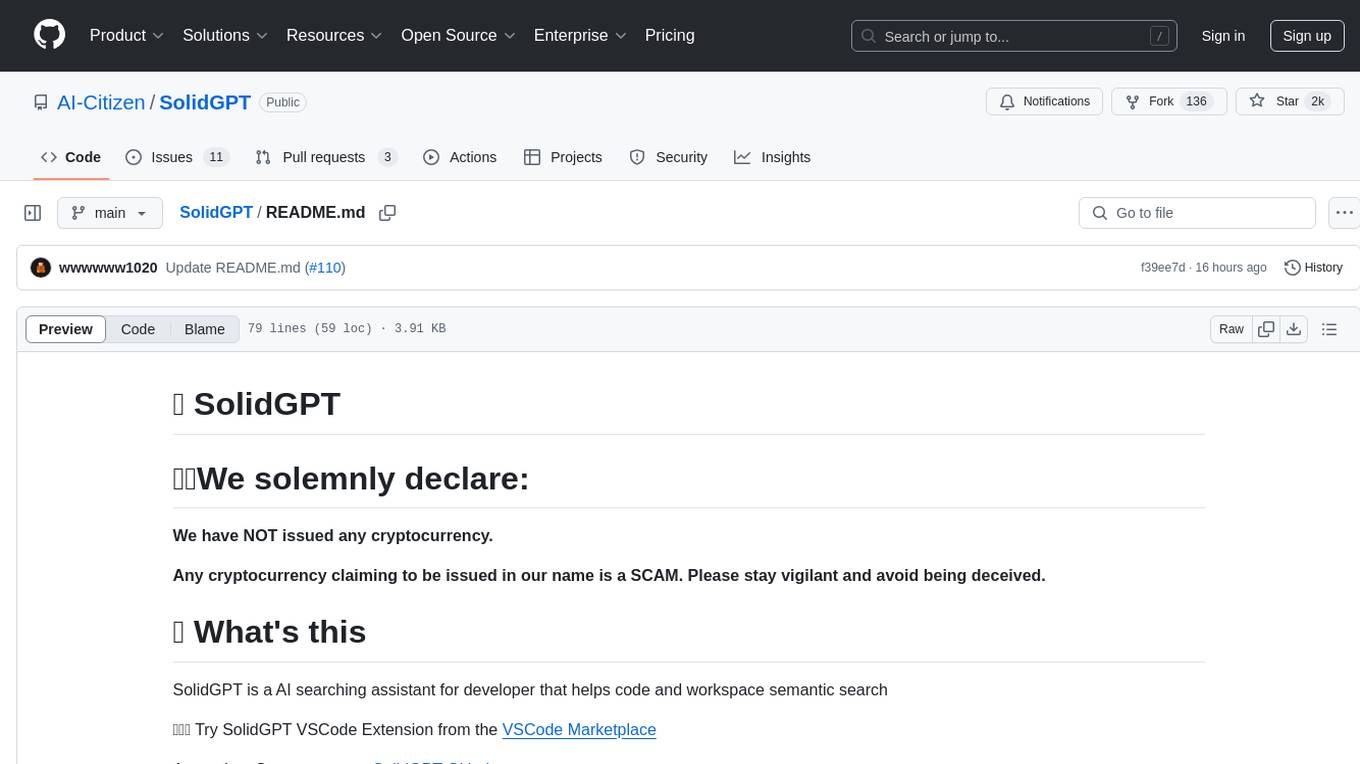
SolidGPT
SolidGPT is an AI searching assistant for developers that helps with code and workspace semantic search. It provides features such as talking to your codebase, asking questions about your codebase, semantic search and summary in Notion, and getting questions answered from your codebase and Notion without context switching. The tool ensures data safety by not collecting users' data and uses the OpenAI series model API.
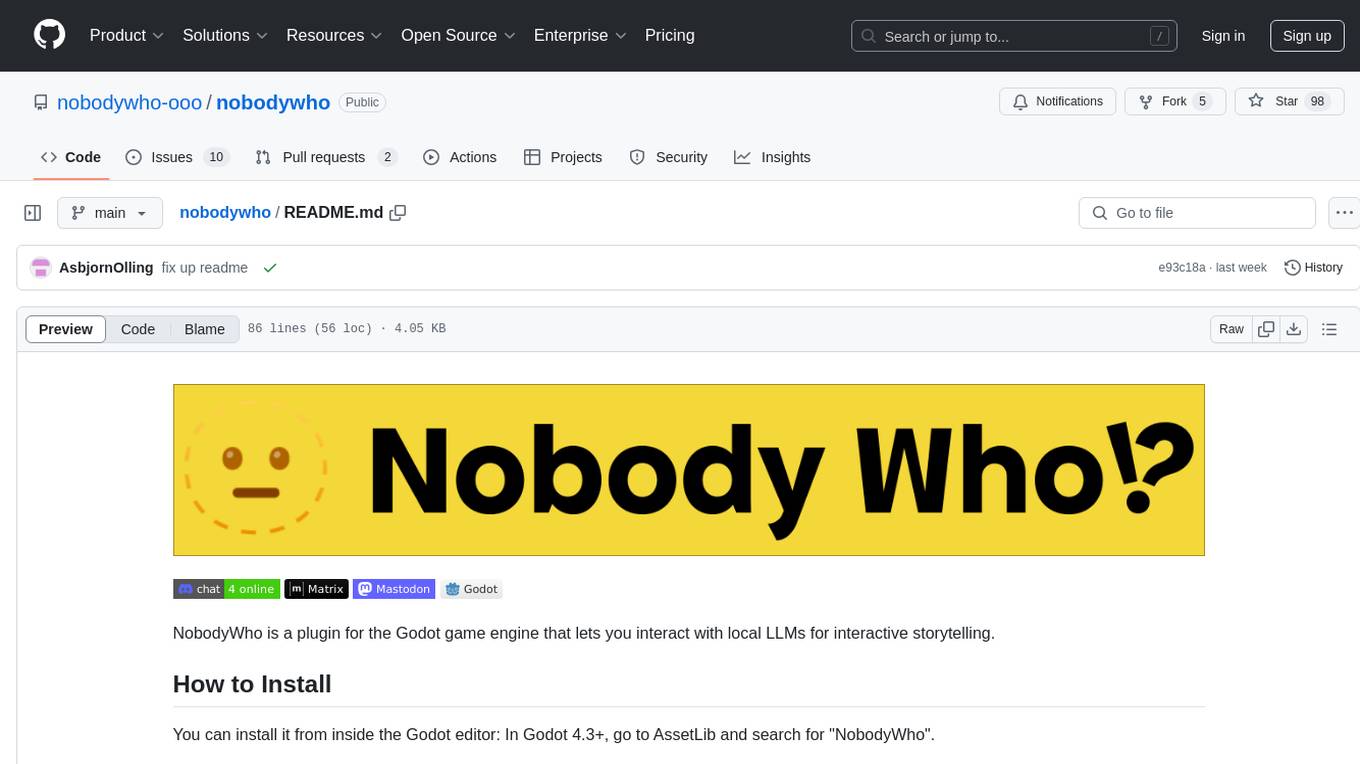
nobodywho
NobodyWho is a plugin for the Godot game engine that enables interaction with local LLMs for interactive storytelling. Users can install it from Godot editor or GitHub releases page, providing their own LLM in GGUF format. The plugin consists of `NobodyWhoModel` node for model file, `NobodyWhoChat` node for chat interaction, and `NobodyWhoEmbedding` node for generating embeddings. It offers a programming interface for sending text to LLM, receiving responses, and starting the LLM worker.
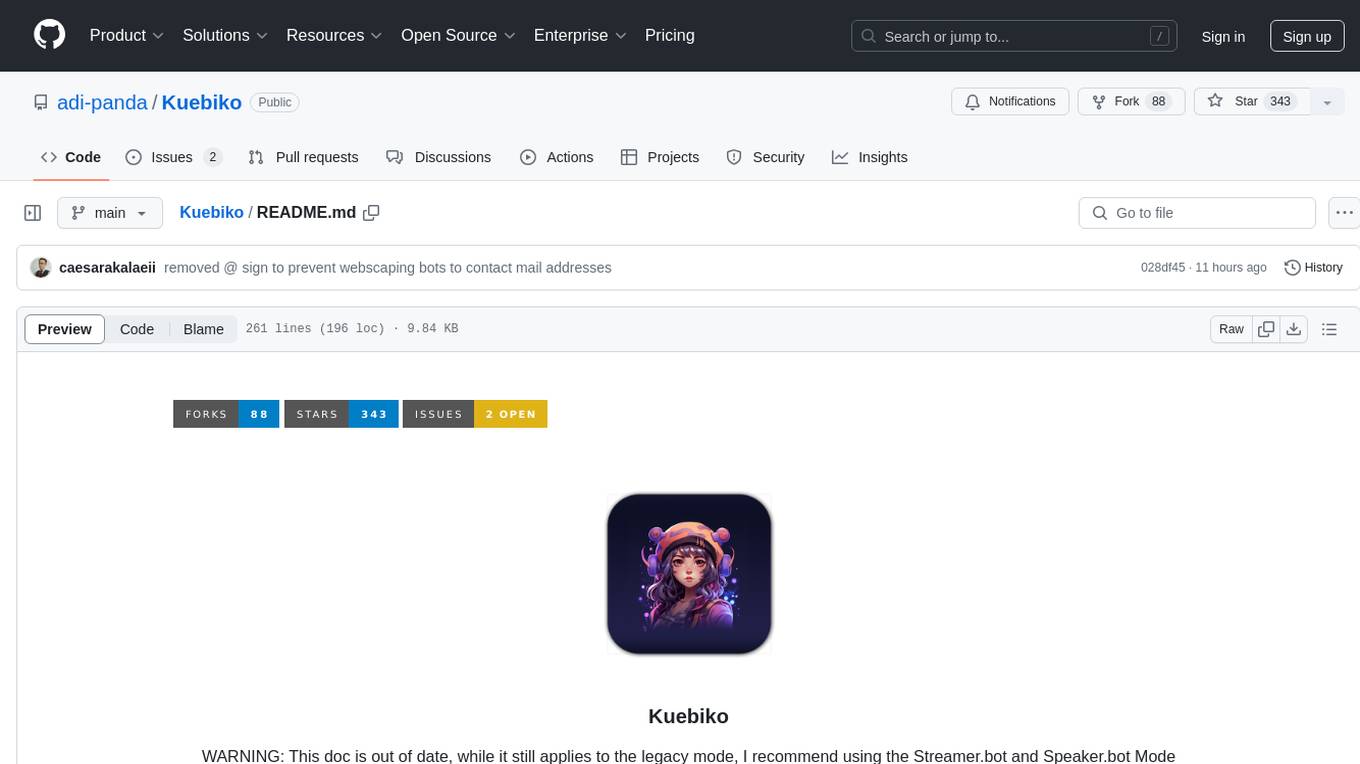
Kuebiko
Kuebiko is a Twitch Chat Bot that reads twitch chat and generates text-to-speech responses using Google Cloud API and OpenAI's GPT-3 text completion model. It allows users to set up their own VTuber AI similar to 'Neuro-Sama'. The project is built with Python and requires setting up various API keys and configurations to enable the bot functionality. Users can customize the voice of their VTuber and route audio using VBAudio Cable. Kuebiko provides a unique way to interact with viewers through chat responses and captions in OBS.
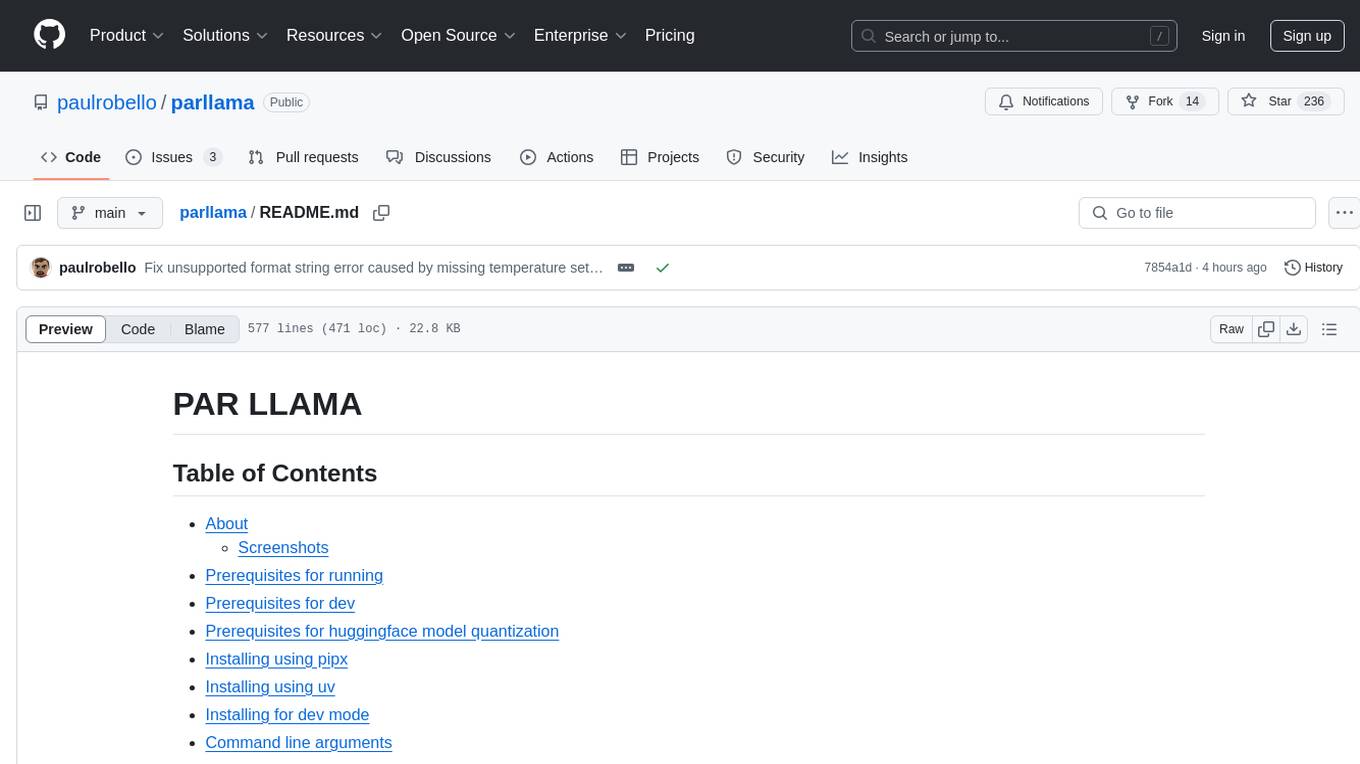
parllama
PAR LLAMA is a Text UI application for managing and using LLMs, designed with Textual and Rich and PAR AI Core. It runs on major OS's including Windows, Windows WSL, Mac, and Linux. Supports Dark and Light mode, custom themes, and various workflows like Ollama chat, image chat, and OpenAI provider chat. Offers features like custom prompts, themes, environment variables configuration, and remote instance connection. Suitable for managing and using LLMs efficiently.
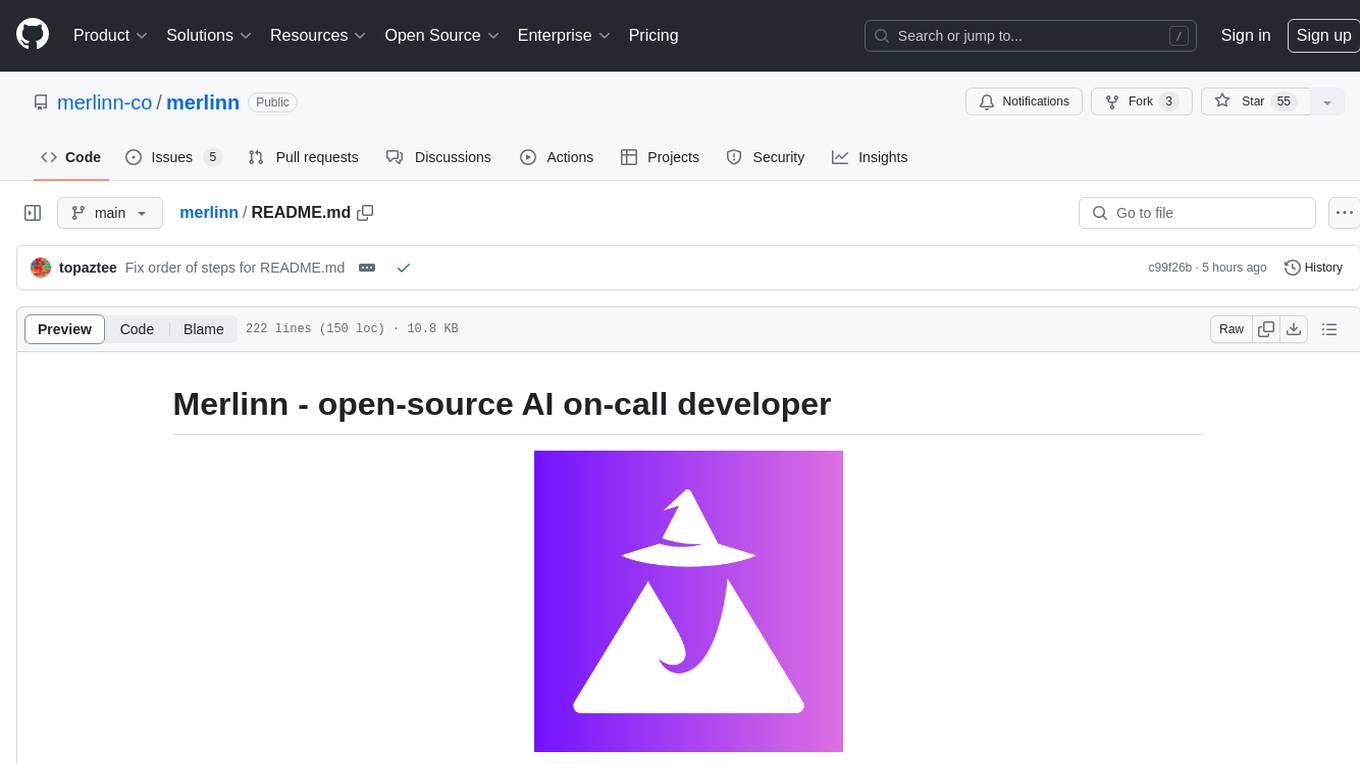
merlinn
Merlinn is an open-source AI-powered on-call engineer that automatically jumps into incidents & alerts, providing useful insights and RCA in real time. It integrates with popular observability tools, lives inside Slack, offers an intuitive UX, and prioritizes security. Users can self-host Merlinn, use it for free, and benefit from automatic RCA, Slack integration, integrations with various tools, intuitive UX, and security features.
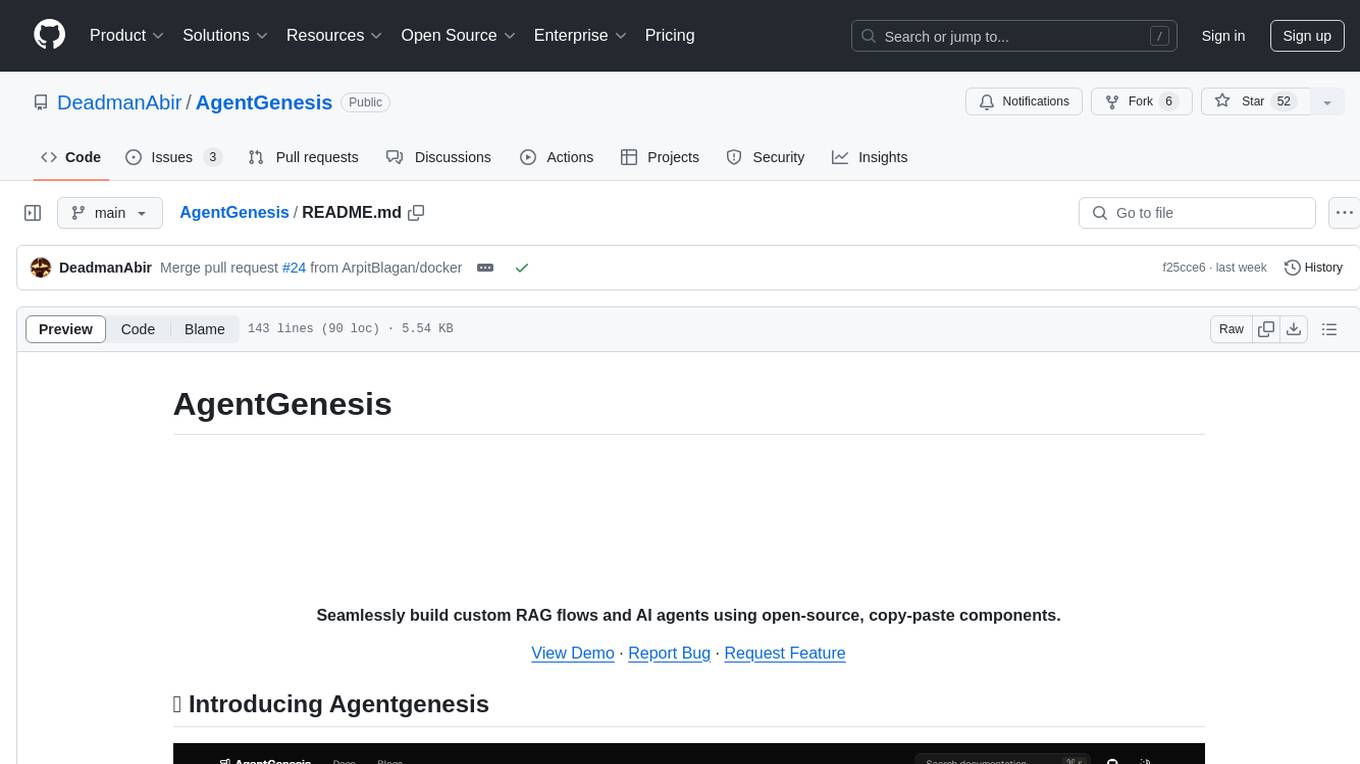
AgentGenesis
AgentGenesis is an open-source web app that provides customizable Gen AI code snippets for building custom RAG flows and AI agents. Users can easily copy and paste components into their applications, modify the code as needed, and build on top of it. The tool aims to simplify the development process by offering pre-built code snippets that can be integrated seamlessly into projects without the need for npm installation. AgentGenesis encourages contributions, positive feedback, and support from the community to enhance and grow the project.
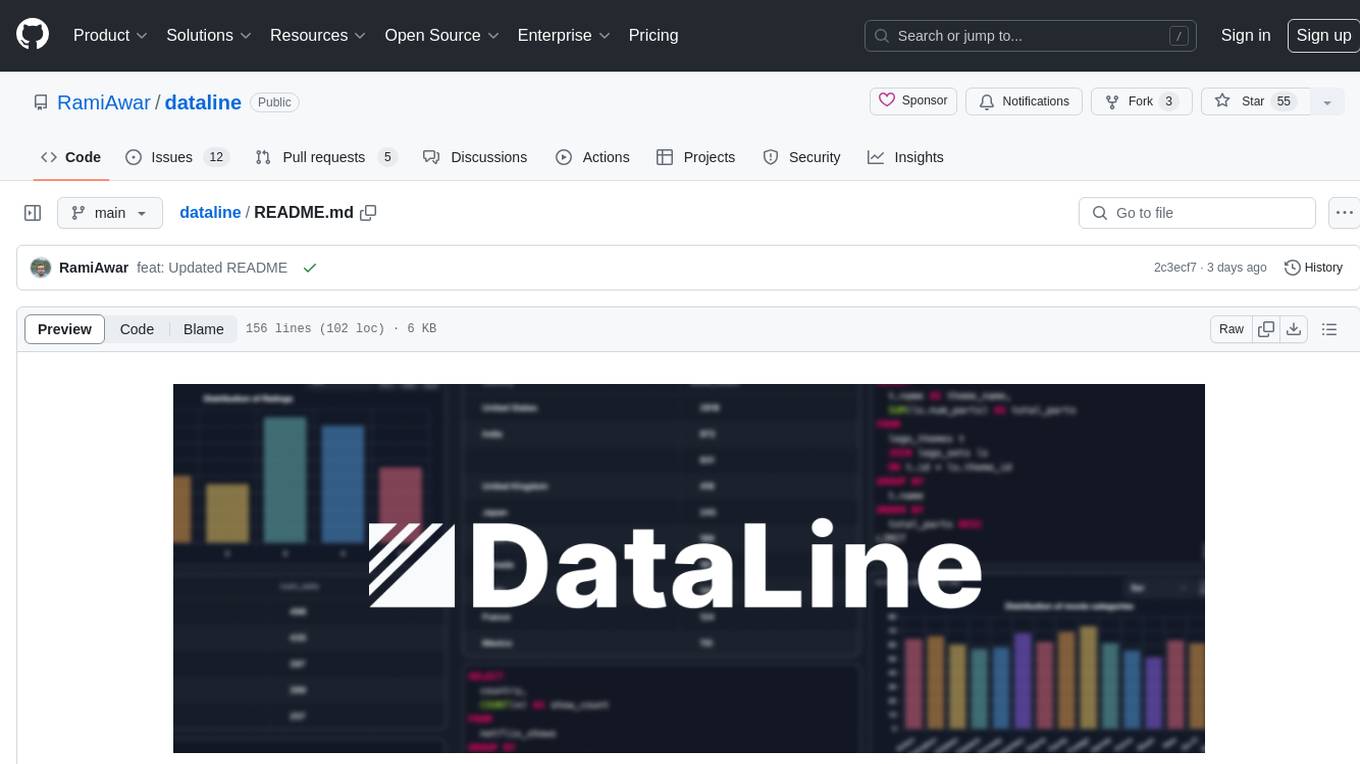
dataline
DataLine is an AI-driven data analysis and visualization tool designed for technical and non-technical users to explore data quickly. It offers privacy-focused data storage on the user's device, supports various data sources, generates charts, executes queries, and facilitates report building. The tool aims to speed up data analysis tasks for businesses and individuals by providing a user-friendly interface and natural language querying capabilities.
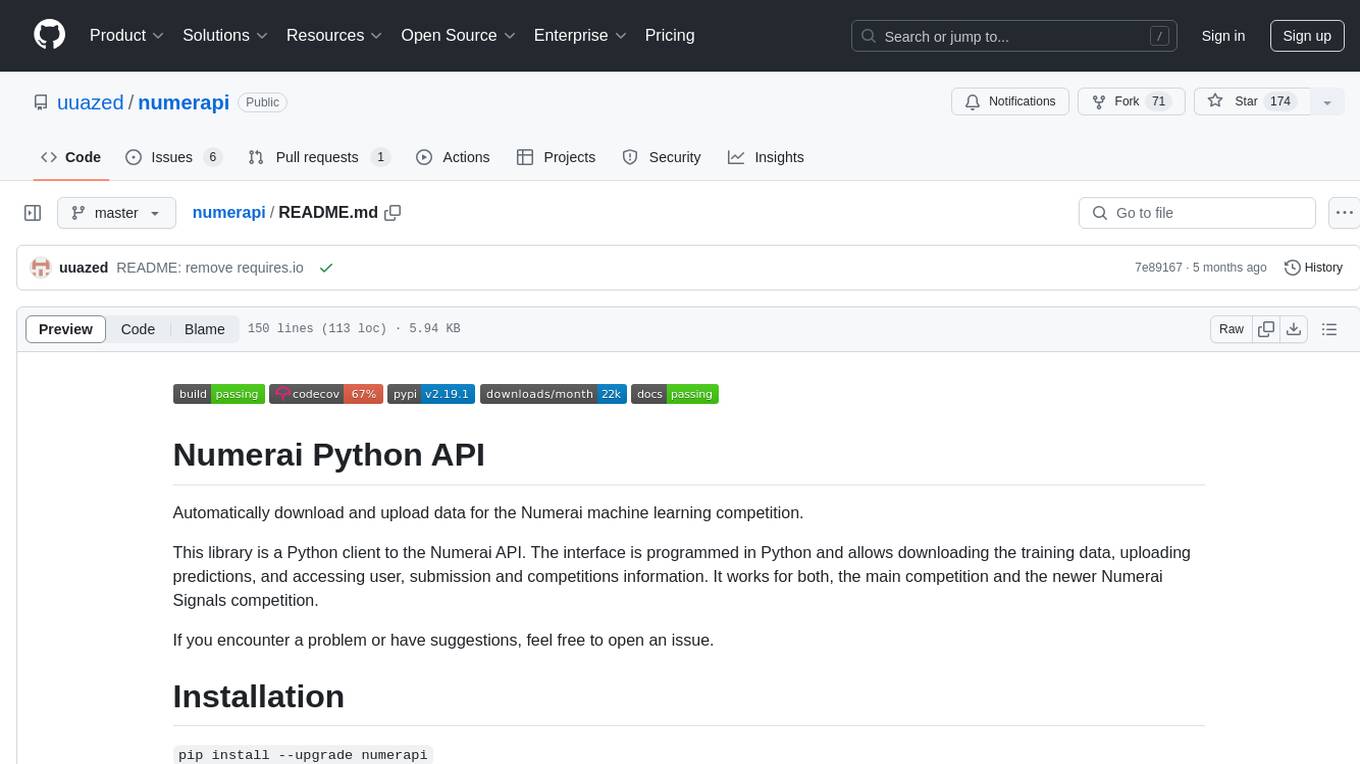
numerapi
Numerapi is a Python client to the Numerai API that allows users to automatically download and upload data for the Numerai machine learning competition. It provides functionalities for downloading training data, uploading predictions, and accessing user, submission, and competitions information for both the main competition and Numerai Signals competition. Users can interact with the API using Python modules or command line interface. Tokens are required for certain actions like uploading predictions or staking, which can be obtained from Numer.ai account settings. The tool also supports features like checking new rounds, getting leaderboards, and managing stakes.
For similar tasks

SunoApi
SunoAPI is an unofficial client for Suno AI, built on Python and Streamlit. It supports functions like generating music and obtaining music information. Users can set up multiple account information to be saved for use. The tool also features built-in maintenance and activation functions for tokens, eliminating concerns about token expiration. It supports multiple languages and allows users to upload pictures for generating songs based on image content analysis.

lollms-webui
LoLLMs WebUI (Lord of Large Language Multimodal Systems: One tool to rule them all) is a user-friendly interface to access and utilize various LLM (Large Language Models) and other AI models for a wide range of tasks. With over 500 AI expert conditionings across diverse domains and more than 2500 fine tuned models over multiple domains, LoLLMs WebUI provides an immediate resource for any problem, from car repair to coding assistance, legal matters, medical diagnosis, entertainment, and more. The easy-to-use UI with light and dark mode options, integration with GitHub repository, support for different personalities, and features like thumb up/down rating, copy, edit, and remove messages, local database storage, search, export, and delete multiple discussions, make LoLLMs WebUI a powerful and versatile tool.
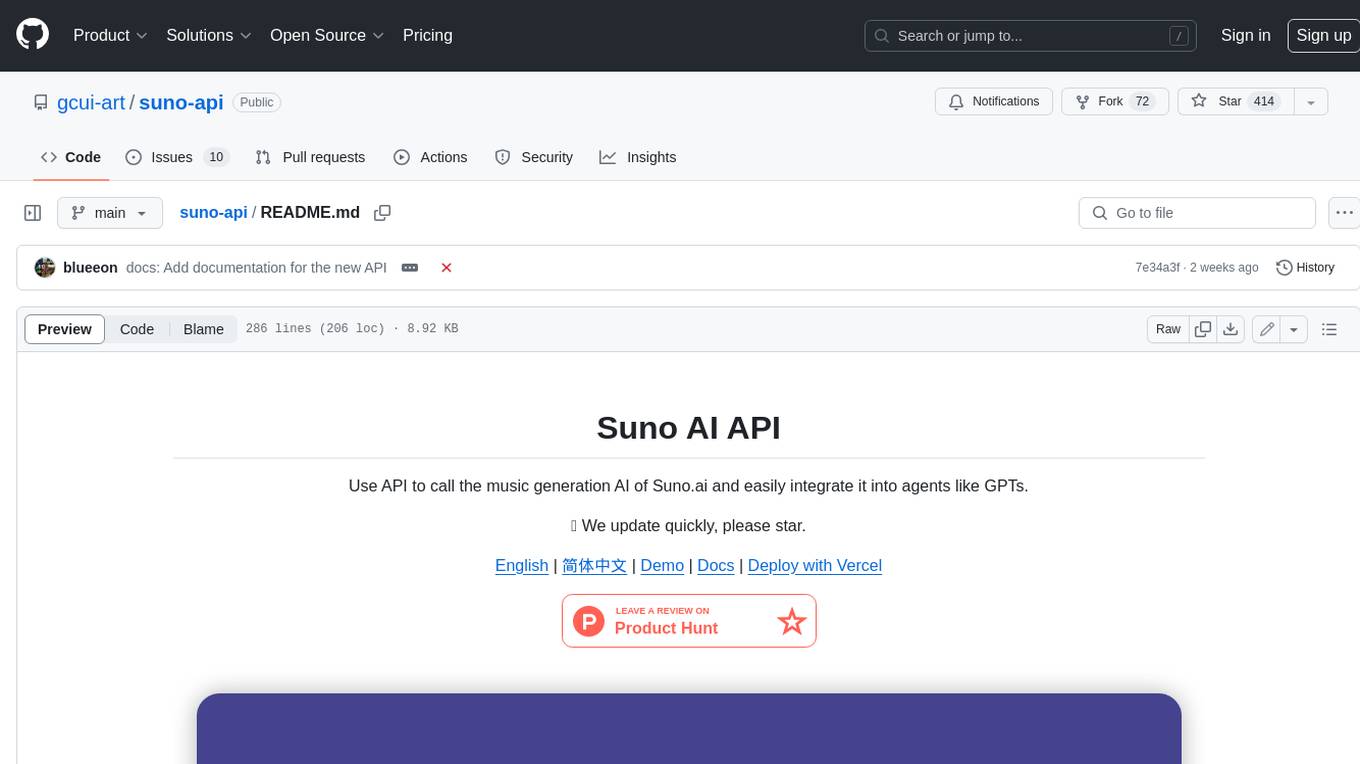
suno-api
Suno AI API is an open-source project that allows developers to integrate the music generation capabilities of Suno.ai into their own applications. The API provides a simple and convenient way to generate music, lyrics, and other audio content using Suno.ai's powerful AI models. With Suno AI API, developers can easily add music generation functionality to their apps, websites, and other projects.
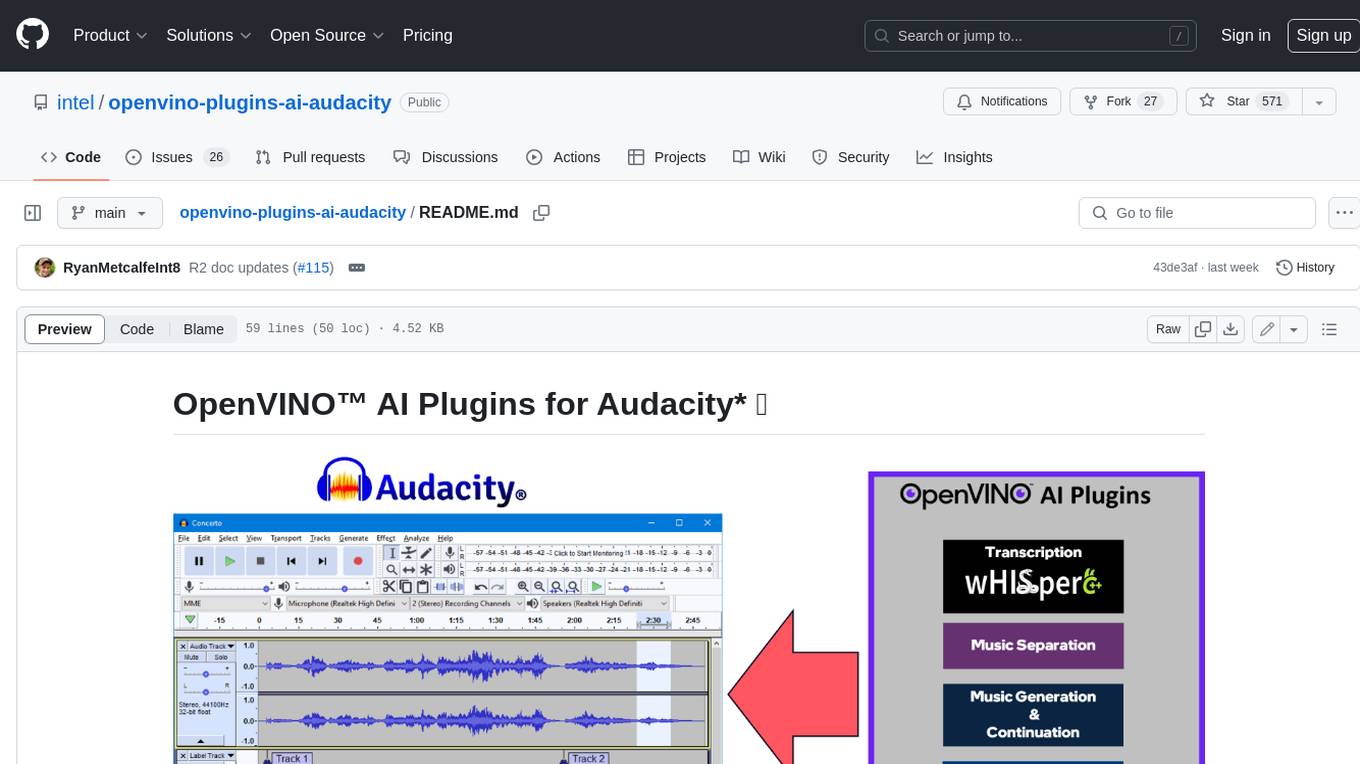
openvino-plugins-ai-audacity
OpenVINO™ AI Plugins for Audacity* are a set of AI-enabled effects, generators, and analyzers for Audacity®. These AI features run 100% locally on your PC -- no internet connection necessary! OpenVINO™ is used to run AI models on supported accelerators found on the user's system such as CPU, GPU, and NPU. * **Music Separation**: Separate a mono or stereo track into individual stems -- Drums, Bass, Vocals, & Other Instruments. * **Noise Suppression**: Removes background noise from an audio sample. * **Music Generation & Continuation**: Uses MusicGen LLM to generate snippets of music, or to generate a continuation of an existing snippet of music. * **Whisper Transcription**: Uses whisper.cpp to generate a label track containing the transcription or translation for a given selection of spoken audio or vocals.
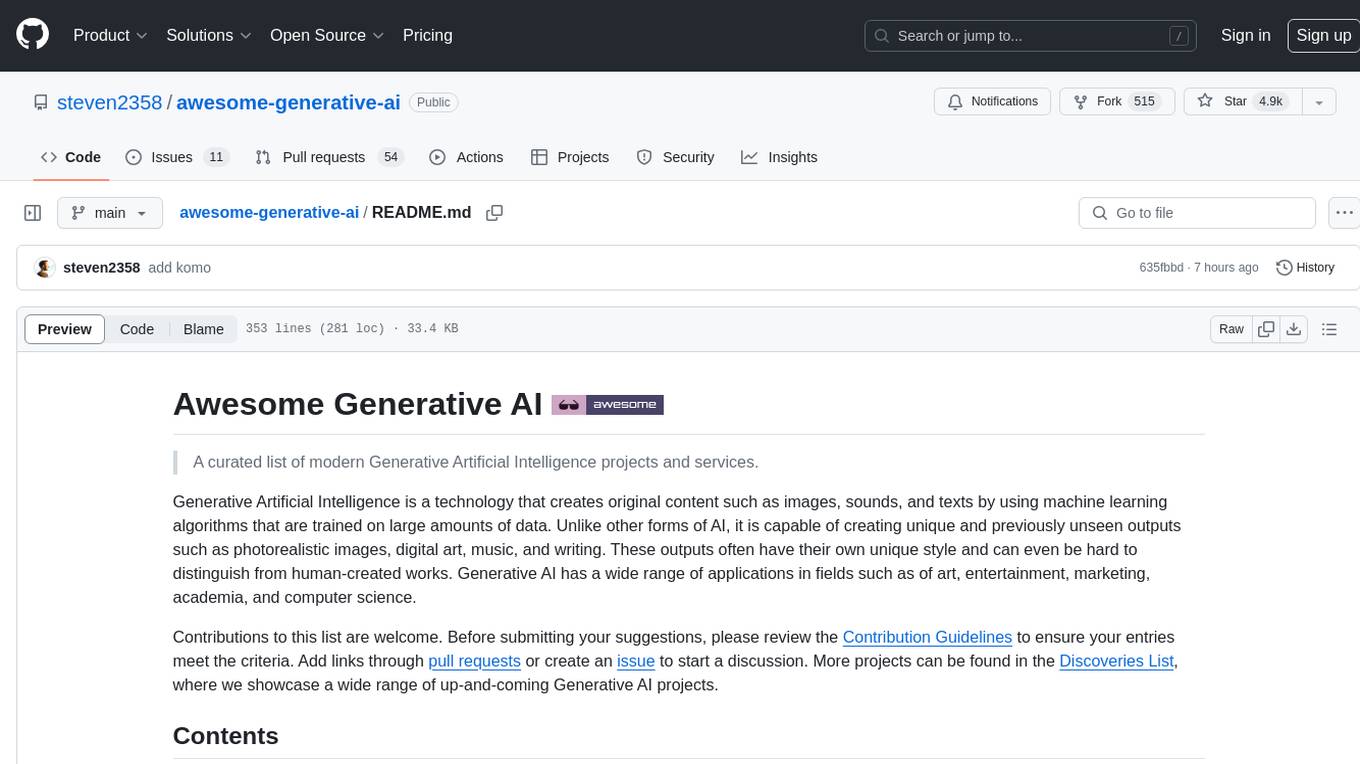
awesome-generative-ai
Awesome Generative AI is a curated list of modern Generative Artificial Intelligence projects and services. Generative AI technology creates original content like images, sounds, and texts using machine learning algorithms trained on large data sets. It can produce unique and realistic outputs such as photorealistic images, digital art, music, and writing. The repo covers a wide range of applications in art, entertainment, marketing, academia, and computer science.
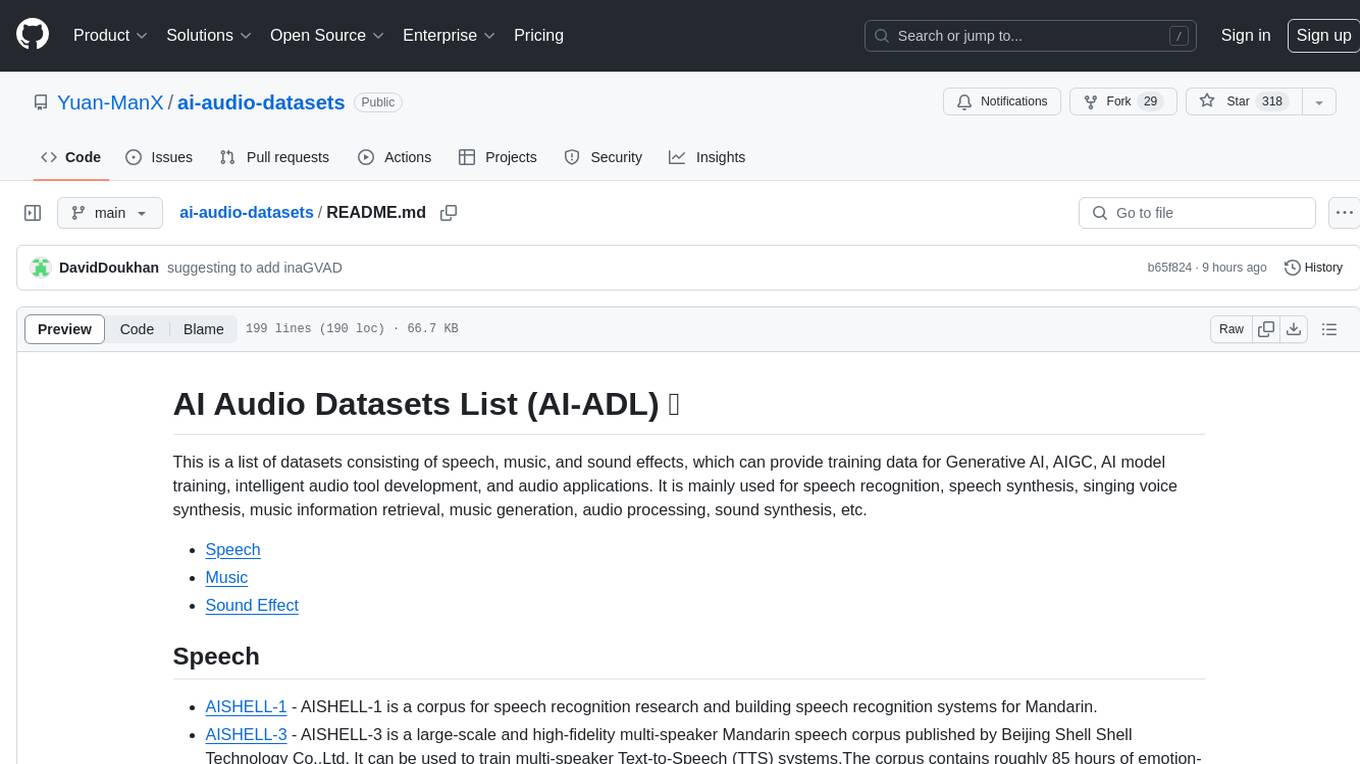
ai-audio-datasets
AI Audio Datasets List (AI-ADL) is a comprehensive collection of datasets consisting of speech, music, and sound effects, used for Generative AI, AIGC, AI model training, and audio applications. It includes datasets for speech recognition, speech synthesis, music information retrieval, music generation, audio processing, sound synthesis, and more. The repository provides a curated list of diverse datasets suitable for various AI audio tasks.
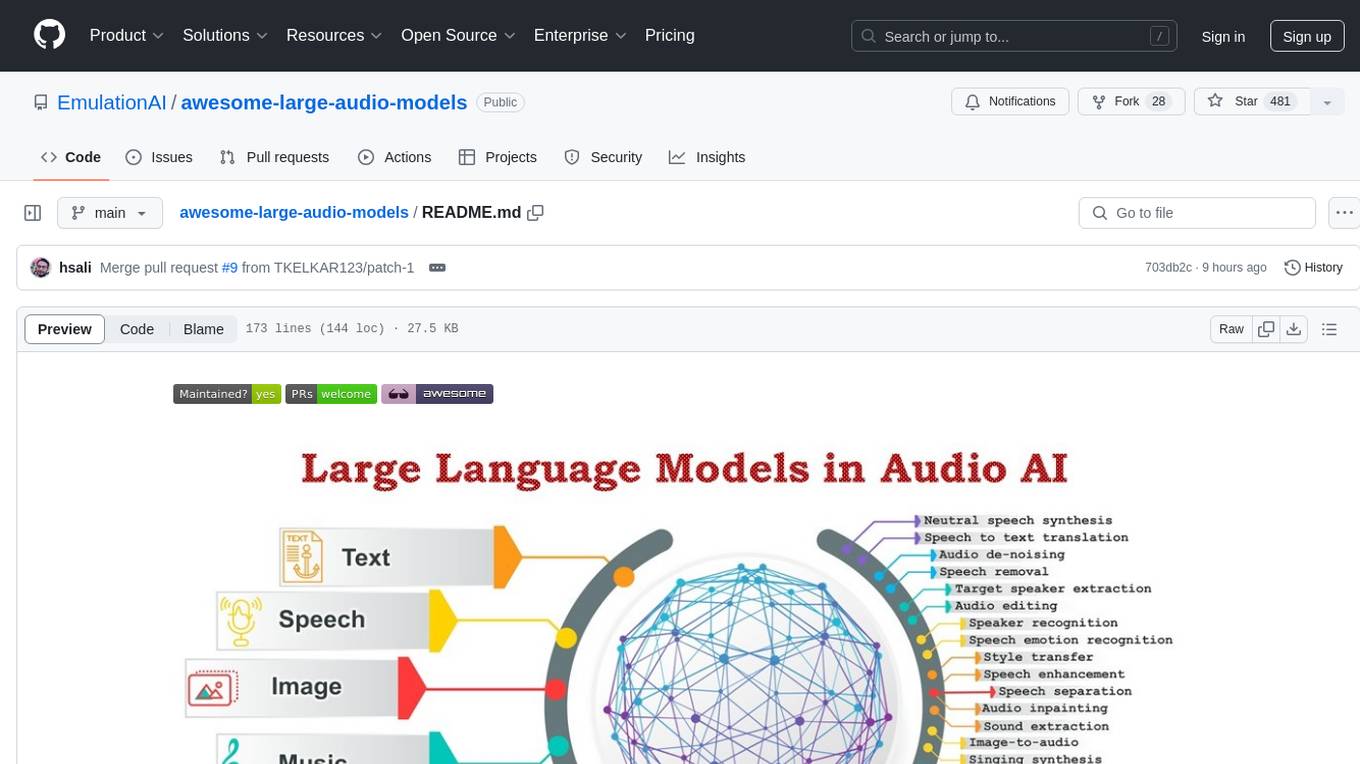
awesome-large-audio-models
This repository is a curated list of awesome large AI models in audio signal processing, focusing on the application of large language models to audio tasks. It includes survey papers, popular large audio models, automatic speech recognition, neural speech synthesis, speech translation, other speech applications, large audio models in music, and audio datasets. The repository aims to provide a comprehensive overview of recent advancements and challenges in applying large language models to audio signal processing, showcasing the efficacy of transformer-based architectures in various audio tasks.
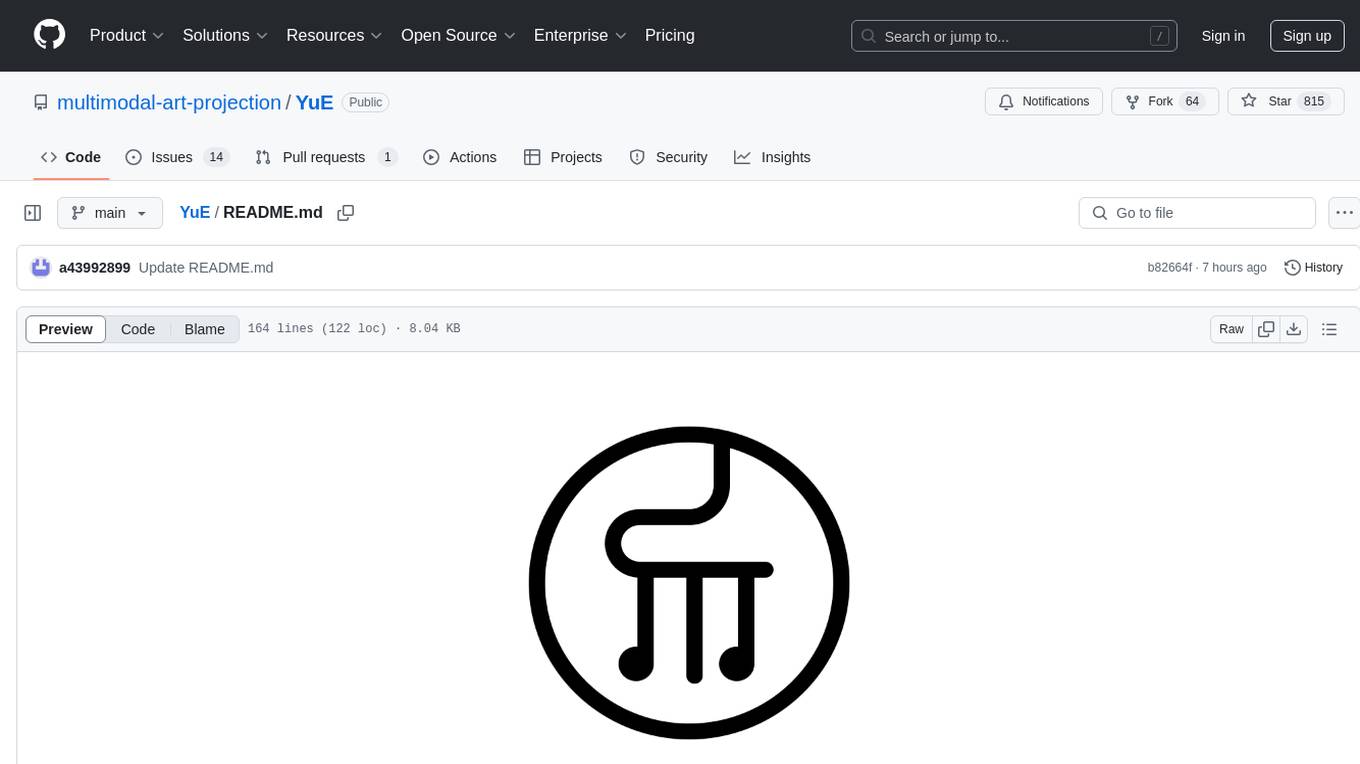
YuE
YuE (乐) is an open-source foundation model designed for music generation, specifically transforming lyrics into full songs. It can generate complete songs in various genres and vocal styles, ensuring a polished and cohesive result. The model requires significant GPU memory for generating long sequences and recommends specific configurations for optimal performance. Users can customize the number of sessions for memory usage. The tool provides a quickstart guide for generating music using Transformers and includes tips for execution time and tag selection. The project is licensed under Creative Commons Attribution Non Commercial 4.0.
For similar jobs

weave
Weave is a toolkit for developing Generative AI applications, built by Weights & Biases. With Weave, you can log and debug language model inputs, outputs, and traces; build rigorous, apples-to-apples evaluations for language model use cases; and organize all the information generated across the LLM workflow, from experimentation to evaluations to production. Weave aims to bring rigor, best-practices, and composability to the inherently experimental process of developing Generative AI software, without introducing cognitive overhead.

LLMStack
LLMStack is a no-code platform for building generative AI agents, workflows, and chatbots. It allows users to connect their own data, internal tools, and GPT-powered models without any coding experience. LLMStack can be deployed to the cloud or on-premise and can be accessed via HTTP API or triggered from Slack or Discord.

VisionCraft
The VisionCraft API is a free API for using over 100 different AI models. From images to sound.

kaito
Kaito is an operator that automates the AI/ML inference model deployment in a Kubernetes cluster. It manages large model files using container images, avoids tuning deployment parameters to fit GPU hardware by providing preset configurations, auto-provisions GPU nodes based on model requirements, and hosts large model images in the public Microsoft Container Registry (MCR) if the license allows. Using Kaito, the workflow of onboarding large AI inference models in Kubernetes is largely simplified.

PyRIT
PyRIT is an open access automation framework designed to empower security professionals and ML engineers to red team foundation models and their applications. It automates AI Red Teaming tasks to allow operators to focus on more complicated and time-consuming tasks and can also identify security harms such as misuse (e.g., malware generation, jailbreaking), and privacy harms (e.g., identity theft). The goal is to allow researchers to have a baseline of how well their model and entire inference pipeline is doing against different harm categories and to be able to compare that baseline to future iterations of their model. This allows them to have empirical data on how well their model is doing today, and detect any degradation of performance based on future improvements.

tabby
Tabby is a self-hosted AI coding assistant, offering an open-source and on-premises alternative to GitHub Copilot. It boasts several key features: * Self-contained, with no need for a DBMS or cloud service. * OpenAPI interface, easy to integrate with existing infrastructure (e.g Cloud IDE). * Supports consumer-grade GPUs.

spear
SPEAR (Simulator for Photorealistic Embodied AI Research) is a powerful tool for training embodied agents. It features 300 unique virtual indoor environments with 2,566 unique rooms and 17,234 unique objects that can be manipulated individually. Each environment is designed by a professional artist and features detailed geometry, photorealistic materials, and a unique floor plan and object layout. SPEAR is implemented as Unreal Engine assets and provides an OpenAI Gym interface for interacting with the environments via Python.

Magick
Magick is a groundbreaking visual AIDE (Artificial Intelligence Development Environment) for no-code data pipelines and multimodal agents. Magick can connect to other services and comes with nodes and templates well-suited for intelligent agents, chatbots, complex reasoning systems and realistic characters.






